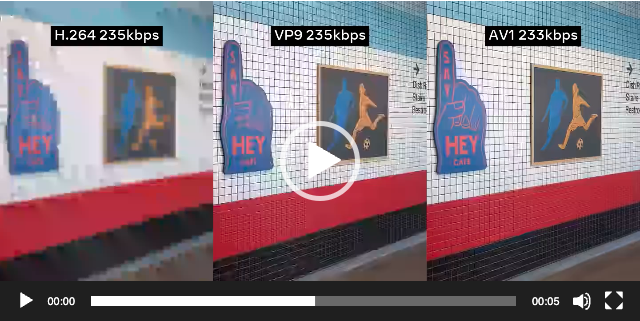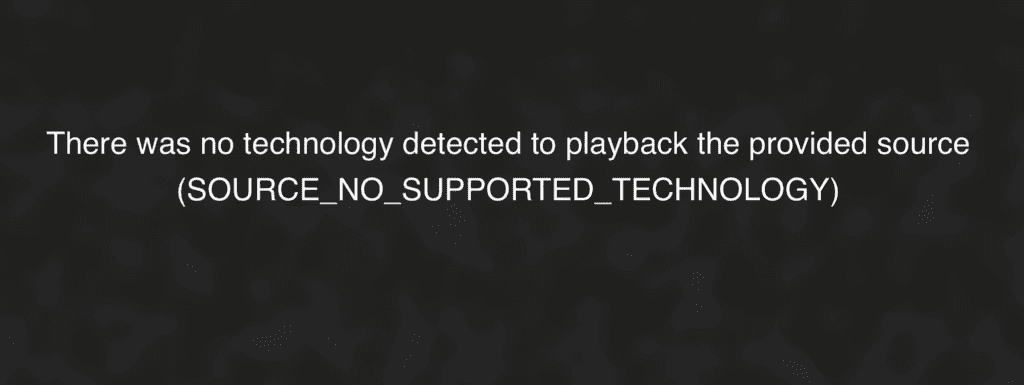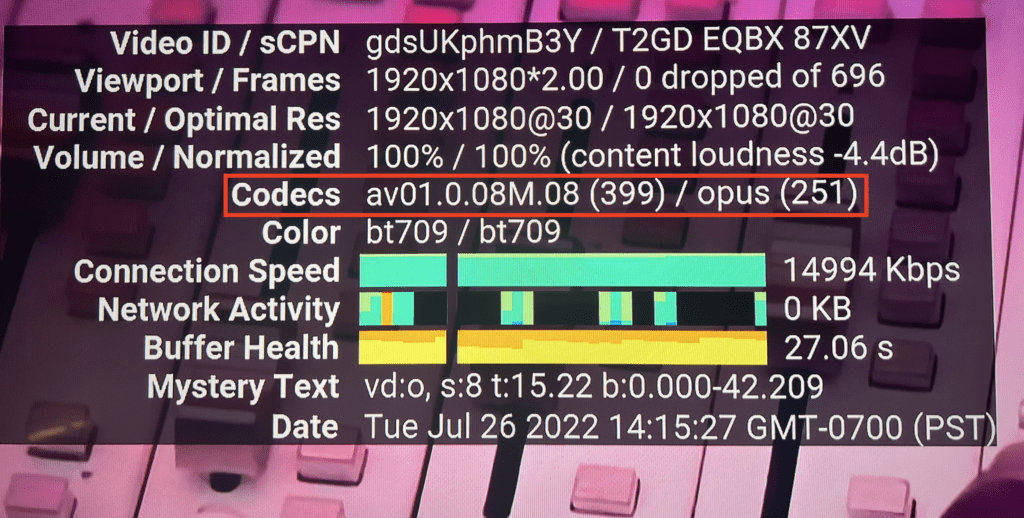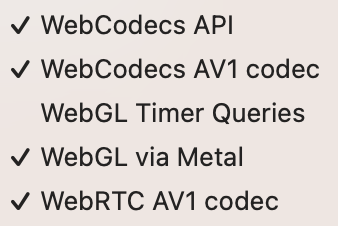Originally published at: AV1 Playback Support: Everything You Need to Know [2023 Update]
In this post, I’ll be taking a look at the current state of AV1 playback support, covering which browsers, mobile devices, smart TVs, consoles and streaming sticks are compatible with the AV1 codec right now. I’ll also touch on some of the incredible bandwidth savings companies like Netflix are seeing with AV1 and detail the latest announcements, rumors and speculation around future AV1 playback support.
Table of Contents
- AV1: The Story So Far (2017-2022)
- Now: AV1 Support in 2023
- Looking Ahead: Future AV1 Support
- Conclusion
AV1: The Story So Far (2017-2022)
Back in 2017, Bitmovin debuted the world’s first AV1 live encoding at the NAB Show in Las Vegas, earning a Best of NAB award. While it was an exciting proof of concept at the time, AV1 playback support was extremely limited and large-scale production usage wouldn’t come until years later. In 2020, YouTube and Netflix began delivering AV1 to the first compatible Android devices, and last year Netflix shared details about their expanded use of AV1 for 4K streams.
Netflix also published a report that showed over the course of one month in early 2022, 21% of their streamed content benefited from the most recent improvements in codec efficiency, like Per-Title optimized AV1 and HEVC. They estimated that without those improvements, total Netflix traffic globally would have been around 24% higher, proving that you can see massive bandwidth and overall cost savings by encoding just a portion of your most popular content with AV1.
Now: AV1 Playback Support in 2023
While we’re all still waiting on Apple to officially support AV1 (more on that later), Meta took matters into their own hands, sharing how they brought AV1 to their Reels videos for Facebook and Instagram, including on iOS devices. This became possible through ongoing open source software decoding efficiency improvements, in particular with the dav1d decoder, developed by VideoLAN. Meta also said they believe for their video products, AV1 is the most viable codec for the coming years. The image below shows how they significantly improved visual quality with AV1 over VP9 and H.264, while keeping the bitrate constant.

At Bitmovin we also believe in the potential of AV1 and have explored the possibilities of software decoding on mobile devices. At a recent internal hackathon, one of our senior software engineers, Roland Kákonyi, built a custom iOS player using the dav1d decoder that was able to decode and smoothly play 1080p AV1 content. We’ll continue exploring this further as a way to fill gaps in playback coverage for devices lacking hardware support.
To answer the question of current playback support as thoroughly as possible, we created several sample streams with different combinations of containers, muxings and DRM. While there will be some exceptions and omissions, especially when you go back to the 2021 and 2020 models, I’ll use the emojis below to show the general level of support you can expect from these platforms and brands right now and give the full results of our direct testing in the table at the end.
- ✅💯 Fully Supported – Successful AV1 playback with all test streams, including DRM
- ✅ Partial or Documented Support – Successfully played at least one, but not all of our test streams OR the product documentation claims AV1 playback support, but has not yet been verified by Bitmovin
- ❌ Not Supported – AV1 playback not supported here currently
Browsers and Operating Systems
✅💯 Chrome
✅💯 Edge
✅ Firefox
❌ Safari
✅💯 Android
✅ Windows
❌ iOS / macOS *(AV1 plays in Chrome and Firefox on macOS)
Generally speaking, the Chrome browser and Android ecosystem handle AV1 well across phones, tablets, smart TVs and set-top boxes/streaming sticks. Unfortunately, the same cannot be said for Safari and iOS where support is lacking.

Firefox was the first major browser to support AV1, but one thing to be aware of is that while Firefox supports the use of Widevine DRM with other codecs, there is currently a bug preventing playback of Widevine-protected AV1.
The Edge browser on Windows 10 and later supports AV1, but you may need to install the free AV1 Video Extension from the Microsoft Store.
For more details about the specific versions and less common browsers that support AV1, check out the table from CanIUse.com here.
Smart TVs
✅ Android TV
✅ Google TV
✅ Samsung
✅ Sony
✅ LG
✅ Amazon Fire TV
As mentioned, Android handles AV1 quite nicely, which also applies to the Smart TVs running Android TV and Google TV operating systems. These include Sony Google TV models from 2021 on and many Amazon Fire TV models as far back as 2020. (FireOS is based on Android)
Samsung TVs (and phones) from late 2020 onward have AV1 hardware decoders and were mentioned by Netflix as some of the first outlets for their 4K AV1 content.
LG has developer documentation stating AV1 is supported for their UHD TVs and projectors running WebOS 5.0 and above, although our testing on some 2020 models was unsuccessful.
Consoles and Streaming Sticks
✅💯 Amazon Fire TV Stick 4K Max
✅ Playstation 4 Pro
✅ Xbox One
✅ Roku Streaming Stick 4K
Playstation 4 Pro was also called out by Netflix as one of the targets for their 4K AV1 streams and it takes advantage of GPU-accelerated decoding. Netflix didn’t publicly mention delivering AV1 to Xbox One, but the same decode libraries that the PS4 Pro uses were first made available for Xbox One, so it should be possible.
The Amazon Fire TV Stick 4K Max has AV1 + DRM support, making it one of the cheapest and best options for giving older 4K TVs an AV1 upgrade.
Roku is a little bit of a gray area at the moment. Officially, they still do not support AV1 as an adaptive streaming video codec, but newer models like the Roku Ultra that have a USB port do support AV1 playback via USB media. There does appear to be some level of support for AV1 adaptive streaming, as the YouTube “stats for nerds” overlay reveals a combination of AV1 video and opus audio playing on many of the popular recommended videos. Hopefully wider support is coming, but in the meantime, did confirm successful playback of our single file “progressive” AV1 MP4 files on the Streaming Stick 4K.

Looking Ahead: Future AV1 Playback Support
Even with gaps in support on some platforms, there is plenty of opportunity to see tangible bandwidth savings and quality improvements from AV1 right now and thankfully, the future looks even brighter. Intel, AMD and Samsung have all announced additional AV1 support coming at the chip level.
Apple Adding AV1 Support?
For services and markets that have sizable audiences on iOS devices, Apple’s lack of AV1 support has been disappointing, but there is reason to be optimistic. First, Apple joined the Alliance for Open Media, the organization responsible for creating and promoting AV1 encoding, back in 2018, which many took as a sign that Apple would eventually support AV1. More recently, updates to Apple’s AVFoundation core media framework show the addition of a new global variable “kCMVideoCodecType_AV1“, and earlier this year, the Safari 16.4 Beta release notes actually showed AV1 support being added, but it was removed without comment shortly after. AV1 WebCodecs support is available as an experimental option in the Safari Technology Preview, but we have not yet confirmed any actual playback.

Conclusion
While AV1 support and adoption has been on the rise and we’ve seen some encouraging announcements, universal support like we have with H.264 is just not there yet. That means AV1 will need to be part of a multi-codec approach for the foreseeable future, but that’s ok! Not that long ago, it took millions of views to offset the higher encoding costs of AV1, but with recent improvements, we’ve seen the break-even point drop to as low as 4,000 views! So for a whole lot of content, encoding with AV1 can already save you money right now and those savings will only increase as more supporting devices become available.
Ready to get started with AV1 encoding? You can try it for free with a Bitmovin Trial, sign up here!
| fMP4 (DASH) | fMP4 with Widevine and Playready (DASH) | Single file “progressive” MP4 (.mp4) | Single file “progressive” MP4 + Widevine (DASH) | WebM (DASH) | WebM + Widevine (DASH) | Single file “progressive” WebM (DASH) | Single file “progressive” WebM + Widevine (DASH) | |
|---|---|---|---|---|---|---|---|---|
| Chrome | ✅ | ✅ | ✅ | ✅ | ✅ | ✅ | ✅ | ✅ |
| Edge | ✅ | ✅ | ✅ | ✅ | ✅ | ✅ | ✅ | ✅ |
| Firefox | ✅ | ❌ | ✅ | ❌ | ✅ | ❌ | ✅ | ❌ |
| Safari | ❌ | ❌ | ❌ | ❌ | ❌ | ❌ | ❌ | ❌ |
| Android Native | ✅ | ✅ | ✅ | ✅ | ✅ | ✅ | ✅ | ✅ |
| Android Web | ✅ | ❌ | ✅ | ❌ | ✅ | ❌ | ✅ | ❌ |
| iOS | ❌ | ❌ | ❌ | ❌ | ❌ | ❌ | ❌ | ❌ |
| Fire TV Max | ✅ | ✅ | ✅ | ✅ | ✅ | ✅ | ✅ | ✅ |
| Fire TV Max Web (Silk Browser) | ✅ | ❌ | ✅ | ❌ | ✅ | ❌ | ✅ | ❌ |
| Roku Streaming Stick 4K | ❌ | ❌ | ✅ | ❌ | ❌ | ❌ | ❌ | ❌ |
| Samsung Tizen (2020 and 2021) | ✅ | ❌ | ✅ | ❌ | ✅ | ❌ | ✅ | ❌ |